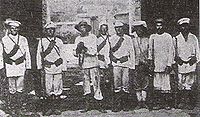
Georgy Matsievsky
Encyclopedia


Harbin
Harbin ; Manchu language: , Harbin; Russian: Харби́н Kharbin ), is the capital and largest city of Heilongjiang Province in Northeast China, lying on the southern bank of the Songhua River...
) was a Baikal Cossack, active participant of the White movement in Transbaikal
White movement in Transbaikal
The White movement in Transbaikal was a period of the confrontation between the Soviets and the Whites over dominance in Transbaikal from December 1917 to November 1920.-Initial stages:...
, Lieutenant-General (1919).
He was a son of Evgeniy Matsievsky. Georgy Matsievsky was graduated from the 3rd Moscow Cadet Corps and the Cavalry Institution in 1903. He volunteered as a private Cossack in the 3rd Verkhneudinsk regiment which participated in the suppression of the Boxer Rebellion
Boxer Rebellion
The Boxer Rebellion, also called the Boxer Uprising by some historians or the Righteous Harmony Society Movement in northern China, was a proto-nationalist movement by the "Righteous Harmony Society" , or "Righteous Fists of Harmony" or "Society of Righteous and Harmonious Fists" , in China between...
. Georgy Matsievsky was awarded with the Order of St. George
Order of St. George
The Military Order of the Holy Great-Martyr and the Triumphant George The Military Order of the Holy Great-Martyr and the Triumphant George The Military Order of the Holy Great-Martyr and the Triumphant George (also known as Order of St. George the Triumphant, Russian: Военный орден Св...
of the Fourth Degree for his bravery during the siege of Wang Gun. From 1903 to 1917 Georgy Matsievsky served as an officer in the 1st Verkhneudinsk regiment.
He took part in the Russo-Japanese War
Russo-Japanese War
The Russo-Japanese War was "the first great war of the 20th century." It grew out of rival imperial ambitions of the Russian Empire and Japanese Empire over Manchuria and Korea...
and in May 1904 Georgy Matsievsky was awarded with the Order of St. Anna
Order of St. Anna
The Order of St. Anna ) is a Holstein and then Russian Imperial order of chivalry established by Karl Friedrich, Duke of Holstein-Gottorp on 14 February 1735, in honour of his wife Anna Petrovna, daughter of Peter the Great of Russia...
of the 4th class when he together with 12 Cossacks broke through from besieged Port Arthur
Lüshunkou
Lüshunkou is a district in the municipality of Dalian, Liaoning province, China. Also called Lüshun City or Lüshun Port, it was formerly known as both Port Arthur and Ryojun....
and delivered an important missive to the head of the Manchurian Army. Georgy Matsievsky was wounded repeatedly.
He was shell-shocked on February 22, 1915 but stayed on the front. Georgy Matsievsky was decorated with the Distinguished Service Order
Distinguished Service Order
The Distinguished Service Order is a military decoration of the United Kingdom, and formerly of other parts of the British Commonwealth and Empire, awarded for meritorious or distinguished service by officers of the armed forces during wartime, typically in actual combat.Instituted on 6 September...
in 1916 and gained a colonel
Colonel
Colonel , abbreviated Col or COL, is a military rank of a senior commissioned officer. It or a corresponding rank exists in most armies and in many air forces; the naval equivalent rank is generally "Captain". It is also used in some police forces and other paramilitary rank structures...
in 1917.
After the end of the war Georgy Matsievsky joined Grigory Semyonov
Grigory Semyonov
Grigory Mikhaylovich Semyonov, or Semenov , was a Japanese-supported leader of the White movement in Transbaikal and beyond from December 1917 to November 1920, Lieutenant General and Ataman of Baikal Cossacks .-Biography:Semyonov was born in the Transbaikal region of eastern Siberia...
in his anti-Bolshevik
Bolshevik
The Bolsheviks, originally also Bolshevists , derived from bol'shinstvo, "majority") were a faction of the Marxist Russian Social Democratic Labour Party which split apart from the Menshevik faction at the Second Party Congress in 1903....
actions. He was one of the first officers enrolled in the Special Manchurian Detachment in December 1917. Georgy Matsievsky headed the 1st Transbaikalian Cossack Regiment (1918), the 1st Transbaikalian Cossack Division (1919) and finally the 1st Transbaikalian Corps of the Far Eastern Army in July 1920. After the defeat and retreat to China in November 1920 Georgy Matsievsky settled down in Harbin where worked as a tramcar driver not participating in political life.

